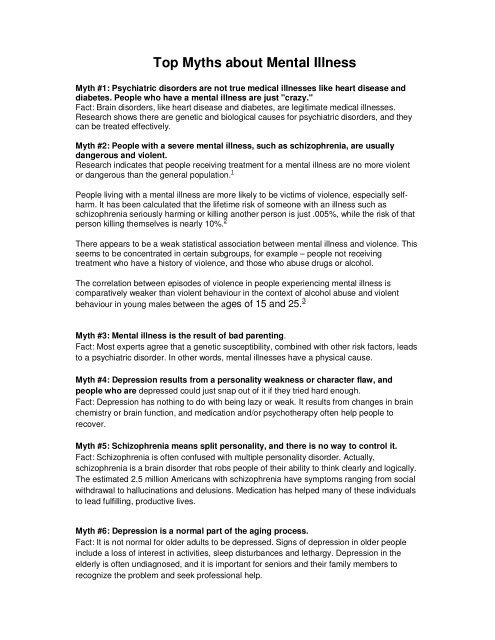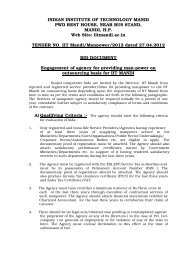Top Myths about Mental Illness - IIT Mandi
Top Myths about Mental Illness - IIT Mandi
Top Myths about Mental Illness - IIT Mandi
You also want an ePaper? Increase the reach of your titles
YUMPU automatically turns print PDFs into web optimized ePapers that Google loves.
<strong>Top</strong> <strong>Myths</strong> <strong>about</strong> <strong>Mental</strong> <strong>Illness</strong><br />
Myth #1: Psychiatric disorders are not true medical illnesses like heart disease and<br />
diabetes. People who have a mental illness are just "crazy."<br />
Fact: Brain disorders, like heart disease and diabetes, are legitimate medical illnesses.<br />
Research shows there are genetic and biological causes for psychiatric disorders, and they<br />
can be treated effectively.<br />
Myth #2: People with a severe mental illness, such as schizophrenia, are usually<br />
dangerous and violent.<br />
Research indicates that people receiving treatment for a mental illness are no more violent<br />
or dangerous than the general population. 1<br />
People living with a mental illness are more likely to be victims of violence, especially selfharm.<br />
It has been calculated that the lifetime risk of someone with an illness such as<br />
schizophrenia seriously harming or killing another person is just .005%, while the risk of that<br />
person killing themselves is nearly 10%. 2<br />
There appears to be a weak statistical association between mental illness and violence. This<br />
seems to be concentrated in certain subgroups, for example – people not receiving<br />
treatment who have a history of violence, and those who abuse drugs or alcohol.<br />
The correlation between episodes of violence in people experiencing mental illness is<br />
comparatively weaker than violent behaviour in the context of alcohol abuse and violent<br />
behaviour in young males between the ages of 15 and 25. 3<br />
Myth #3: <strong>Mental</strong> illness is the result of bad parenting.<br />
Fact: Most experts agree that a genetic susceptibility, combined with other risk factors, leads<br />
to a psychiatric disorder. In other words, mental illnesses have a physical cause.<br />
Myth #4: Depression results from a personality weakness or character flaw, and<br />
people who are depressed could just snap out of it if they tried hard enough.<br />
Fact: Depression has nothing to do with being lazy or weak. It results from changes in brain<br />
chemistry or brain function, and medication and/or psychotherapy often help people to<br />
recover.<br />
Myth #5: Schizophrenia means split personality, and there is no way to control it.<br />
Fact: Schizophrenia is often confused with multiple personality disorder. Actually,<br />
schizophrenia is a brain disorder that robs people of their ability to think clearly and logically.<br />
The estimated 2.5 million Americans with schizophrenia have symptoms ranging from social<br />
withdrawal to hallucinations and delusions. Medication has helped many of these individuals<br />
to lead fulfilling, productive lives.<br />
Myth #6: Depression is a normal part of the aging process.<br />
Fact: It is not normal for older adults to be depressed. Signs of depression in older people<br />
include a loss of interest in activities, sleep disturbances and lethargy. Depression in the<br />
elderly is often undiagnosed, and it is important for seniors and their family members to<br />
recognize the problem and seek professional help.
Myth #7: Depression and other illnesses, such as anxiety disorders, do not affect<br />
children or adolescents. Any problems they have are just a part of growing up.<br />
Fact: Children and adolescents can develop severe mental illnesses. In the United States,<br />
one in ten children and adolescents has a mental disorder severe enough to cause<br />
impairment. However, only <strong>about</strong> 20 percent of these children receive needed treatment.<br />
Left untreated, these problems can get worse. Anyone talking <strong>about</strong> suicide should be taken<br />
very seriously.<br />
Myth #8: If you have a mental illness, you can will it away. Being treated for a<br />
psychiatric disorder means an individual has in some way "failed" or is weak.<br />
Fact: A serious mental illness cannot be willed away. Ignoring the problem does not make it<br />
go away, either. It takes courage to seek professional help.<br />
Myth # 9: <strong>Mental</strong> illness is a life sentence<br />
• Depending on the age of onset and the severity of the mental illness, generally<br />
speaking, most people will experience complete recovery, especially if they receive<br />
help early. Some people may require ongoing treatment to manage their illness.<br />
• Some people have only one episode of mental illness and recover fully. For others,<br />
episodes of mental illness occur occasionally with years of wellness between<br />
episodes. For a minority of those with a more severe illness, periods of acute illness<br />
will occur regularly and, without medication and effective management, leave little<br />
room for recovery.<br />
• Though some people experience significant disability as a result of a mental illness,<br />
many go on to live full and productive lives while receiving ongoing treatment.<br />
Myth # 10: <strong>Mental</strong> illnesses are all the same<br />
• There are many types of mental illnesses and many kinds of symptoms or effects.<br />
• Though a particular mental illness will tend to show a certain range of symptoms, not<br />
everyone will experience the same symptoms – for example many people with<br />
schizophrenia may hear voices, while others may not.<br />
• Simply knowing a person has a mental illness will not tell you how well or ill they are,<br />
what symptoms they are experiencing, or whether they may recover or manage the<br />
illness effectively.<br />
• <strong>Mental</strong> illnesses are not purely ‘psychological’ and can have many physical<br />
features. While a mental illness may affect a person’s thinking and emotions, it can<br />
also have strong physical effects such as insomnia, speech impediment, weight gain<br />
or loss, increase or loss of energy, chest pain and nausea.<br />
Acknowledgements:<br />
http://thyroid.<strong>about</strong>.com/library/news/blmentalmyths.htm<br />
http://www.mindframe-media.info/site/index.cfm?display=105839#ref3
















